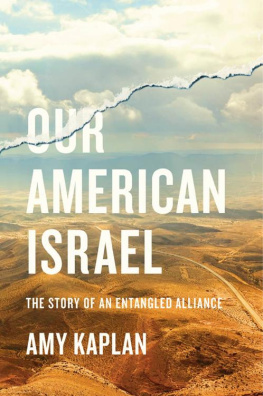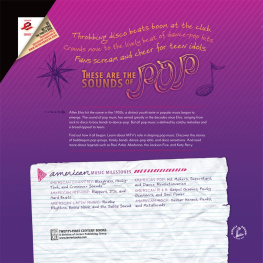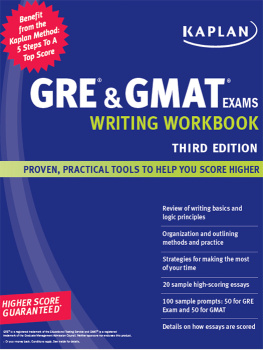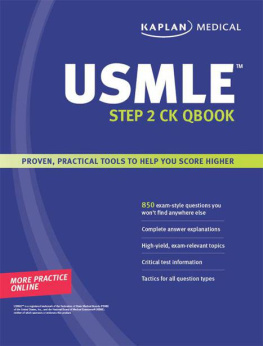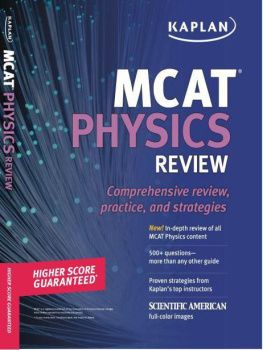Amy Kaplan - Our American Israel
Here you can read online Amy Kaplan - Our American Israel full text of the book (entire story) in english for free. Download pdf and epub, get meaning, cover and reviews about this ebook. year: 2018, publisher: Harvard University Press, genre: Politics. Description of the work, (preface) as well as reviews are available. Best literature library LitArk.com created for fans of good reading and offers a wide selection of genres:
Romance novel
Science fiction
Adventure
Detective
Science
History
Home and family
Prose
Art
Politics
Computer
Non-fiction
Religion
Business
Children
Humor
Choose a favorite category and find really read worthwhile books. Enjoy immersion in the world of imagination, feel the emotions of the characters or learn something new for yourself, make an fascinating discovery.
- Book:Our American Israel
- Author:
- Publisher:Harvard University Press
- Genre:
- Year:2018
- Rating:3 / 5
- Favourites:Add to favourites
- Your mark:
- 60
- 1
- 2
- 3
- 4
- 5
Our American Israel: summary, description and annotation
We offer to read an annotation, description, summary or preface (depends on what the author of the book "Our American Israel" wrote himself). If you haven't found the necessary information about the book — write in the comments, we will try to find it.
Our American Israel — read online for free the complete book (whole text) full work
Below is the text of the book, divided by pages. System saving the place of the last page read, allows you to conveniently read the book "Our American Israel" online for free, without having to search again every time where you left off. Put a bookmark, and you can go to the page where you finished reading at any time.
Font size:
Interval:
Bookmark:
OUR AMERICAN ISRAEL
THE STORY OF AN ENTANGLED ALLIANCE
Amy Kaplan
Harvard University Press
CAMBRIDGE, MASSACHUSETTSLONDON, ENGLAND2018
Copyright 2018 by the President and Fellows of Harvard College
All rights reserved
Jacket design: Graciela Galup
Jacket photograph: Shutterstock
Paper background: Getty Images
978-0-674-73762-4 (alk. paper)
978-0-674-98992-4 (EPUB)
978-0-674-98993-1 (MOBI)
978-0-674-98991-7 (PDF)
The Library of Congress has cataloged the printed edition as follows:
Names: Kaplan, Amy, author.
Title: Our American Israel : the story of an entangled alliance / Amy Kaplan.
Description: Cambridge, Massachusetts : Harvard University Press, 2018. | Includes bibliographical references and index.
Identifiers: LCCN 2018009015
Subjects: LCSH: IsraelForeign public opinion, American. | National characteristics, American. | United StatesForeign relationsIsrael. | IsraelForeign relationsUnited States.
Classification: LCC E183.8.I7 K36 2018 | DDC 327.7305694dc23
LC record available at https://lccn.loc.gov/2018009015
For Paul
I N 2009, President Barack Obama delivered a historic speech in Cairo, Egypt, where he reached out to Arabs and Muslims to repair some of the damage inflicted by the war on terror. At the same time that he was seeking common ground with the Arab world, however, Obama made a familiar and long-standing claim: Americas strong bonds with Israel are well known. This bond is unbreakable.
Obamas statement was an affirmation that American presidents have routinely voiced since John F. Kennedy spoke of the special relationship between the United States and Israel in 1962. In Cairo, Obamas reiteration of this sentiment was clearly strategic. He had just pointed to the conflict between Israel and Palestine as a major source of tension between the Arab world and the United States. Addressing the human suffering on both sides, he needed to reassure Israel and its American supporters that this balance would not tip the scales against his primary allegiance. He was telling his audience something they already knew well, that the relationship with Israel took precedence over that with the Arab world, and in some way set its parameters. Obamas statement tapped into a vast reservoir of narratives and images, emotions and beliefs about Americas special kinship with Israel. This bond, he said, is based upon cultural and historical ties, and the recognition that the aspiration for a Jewish homeland is rooted in a tragic history that cannot be denied.
Both proponents and critics have long understood the partnership between the United States and Israel as an exception to the norms of international alliances. The United States has given more monetary aid to Israel than to any other nation and has committed itself to maintaining Israels military edge in the region. In December 2016, the Obama administration agreed to a record $38 billion package of military aid over ten years. Diplomatically as well, the relationship is in a category of its own: the United States has protected Israel from international criticism, most notably by casting many vetoes on its behalf in the Security Council of the United Nations.
The fact that this political relationship is expressed as an unbreakable bond implies an affiliation beyond the realm of statecraft. As much a future pledge as a historical description, the phrase has a ring of consecration, like a marriage. A bond connotes both identification and obligation. Unbreakable conveys an aura of timelessness and immutability, a bedrock connection that transcends the vagaries of political alliances.
This book aims to recover the strangeness of an affinity that has come to be seen as self-evident. In 1945, it was not inevitable that a global superpower emerging victorious from World War II would come to identify with a small state for Jewish refugees, refugees who at that time were still being turned away from the United States. How did Zionism, a European movement to establish a homeland for a particular ethnoreligious group, come to resonate with citizens of a nation based on the foundation, or at least the aspiration, of civic equality amid ethnic diversity? How was the creation of a Jewish state in the Middle East translated into a narrative that reflected cherished American tales of national origins? How, in other words, did so many come to feel that the bond between the United States and Israel was historically inevitable, morally right, and a matter of common sense?
Our American Israel is the story of popular perceptions of Israel and of the ways Americans have understood this special relationship. It starts at the end of World War II, with debates about the establishment of a Jewish state in Palestine, and concludes with the war on terror, when the United States adopted a distinctively Israeli conception of homeland security. The political relationship between the two nations has always been entangled with powerful myths about their kinship and heritage, their suffering and salvation. During the seventy years since Israels founding, certain themes have taken on the stature of hallowed beliefs: that the kinship is rooted in a common biblical heritage and shared political values, that the Holocaust created a legacy of unique moral obligations, and that the two countries face threats from common enemies.
The process by which these beliefs developed mythic status and tenacious appeal is a dynamic one. They were created, contested, and transformed over time through metaphors, analogies, and symbols that shaped popular views of political realities and imparted emotional meaning and moral value to political policy. The belief that America is an exceptional nation of moral force and military power underwrote and strengthened its special bond with Israel. The United States would protect and secure Israel, a moral community of both concentration camp survivors and heroic warriors. At the same time, Israel was seen as unique in its own righta state that is both vulnerable and indomitable, an invincible victim.
Diplomatic historians have researched the strategic alliance between the United States and Israel in the international arena, scholars of Jewish history have studied the importance of Israel to the lives of American Jews, and political scientists have examined how the domestic Israel lobby influences geopolitical strategy. However, it is in the wider crucible of American culture that the diverse meanings of the special relationship have been forged, disputed, and remade. Looking at popular narratives about Israel, and the ways in which different individuals and groups have understood Americas relationship with the Jewish state, can reveal the making of this special relationship. From a diverse array of representations and cultural expressions, patterns coalesced to form a broad consensus about Americas attachment to Israel, a consensus that came to seem like common sense. The cultural alchemy that transformed the story of Israel from a particular tale about a specific ethnic state into one that resonates with the American nation as a whole has, in turn, shaped political discourse in America.
Cultural perceptions, to be sure, do not dictate policies. They do, however, create a perceptual field in interaction with those policies and political ideas from which a consensus emerges about the unbreakable bond between the two nations. Cultural artifactswhether a novel, film, newspaper article, or museumdo not work by imposing a singular and monolithic meaning on the relationship between the two nations. But they are effective precisely because they are capacious, inviting different meanings from diverse perspectives while effectively ruling out others.
The special relationship has never been just about the United States and Israel. It has included the Palestinian people from the start, even in mainstream narratives that have denied their existence, or popular images that have made them invisible to the American eye. Dominant narratives that identify Israelis with Americans have always been contested by counternarratives from both inside and outside the United States. The most popular American story of the founding of Israel is modeled on the American revolution as an anticolonial war of independence against the British, as told in the novel and film
Next pageFont size:
Interval:
Bookmark:
Similar books «Our American Israel»
Look at similar books to Our American Israel. We have selected literature similar in name and meaning in the hope of providing readers with more options to find new, interesting, not yet read works.
Discussion, reviews of the book Our American Israel and just readers' own opinions. Leave your comments, write what you think about the work, its meaning or the main characters. Specify what exactly you liked and what you didn't like, and why you think so.

